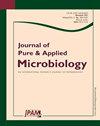Using of Integrons as Biomarker to Assess Dissemination and Diversity of Antimicrobial Resistance Genes in Farm Animal Manure
IF 0.6
Q4 MICROBIOLOGY
引用次数: 0
Abstract
Antimicrobial agents are widely used for treatment of animal and human diseases. Heavy use of antimicrobial agents permits bacteria to develop resistance to these agents specifically when a dose of antibiotic is insufficient or course of treatment is incomplete. Antimicrobial resistance genes (ARGs) are usually associated with mobile genetic elements (MGEs) including Integron therefore; these genes can transmit among bacteria via horizontal transmission. The current study was conducted to assess the possible role of manure in dissemination of antimicrobial resistance. The presence, quantitate, and diversity of resistance genes associated with Integron class 1 have been assessed using conventional and quantitative polymerase chain reaction (PCR) combined with sequencing of gene cassette within Integron and analysis of sequenced data by blast tool. Thirty-eight samples were found a positive for Integron and concentration of Integron in positive sample ranged from from 106-1010 copies/g of manure. High frequencies were detected to genes that encoded to sulphonamide and ammonium compound resistance. These genes were detected in 25% and 23% respectively of the total manure samples. In general, the detected genes in manure functionally belong to five protein families including Efflux pump, DNA repair, heavy metal resistance, membrane protein, and antibiotic resistance. Manure might act as a hotspot from which ARGs emerge and transfer to the environment and then to the animal and human environments.利用整合子作为生物标记物评估抗微生物基因在农场动物粪便中的传播和多样性
抗菌剂广泛用于治疗动物和人类疾病。大量使用抗菌药物会使细菌对这些药物产生耐药性,特别是当抗生素剂量不足或疗程不完整时。因此,抗微生物基因(ARGs)通常与包括Integron在内的可移动遗传元件(MGE)有关;这些基因可以通过水平传播在细菌之间传播。目前的研究是为了评估粪肥在传播抗微生物耐药性中的可能作用。与Integron 1类相关的抗性基因的存在、定量和多样性已经使用常规和定量聚合酶链式反应(PCR)结合Integron内基因盒的测序和通过blast工具对测序数据的分析进行了评估。38个样本被发现Integron呈阳性,阳性样本中Integron的浓度范围为106-1010拷贝/g粪便。对编码磺酰胺和铵化合物抗性的基因检测到高频率。这些基因分别在25%和23%的粪便样品中检测到。一般来说,在粪便中检测到的基因在功能上属于五个蛋白质家族,包括Efflux泵、DNA修复、重金属抗性、膜蛋白和抗生素抗性。粪肥可能是ARGs出现并转移到环境中,然后转移到动物和人类环境中的热点。
本文章由计算机程序翻译,如有差异,请以英文原文为准。
求助全文
约1分钟内获得全文
求助全文
来源期刊

Journal of Pure and Applied Microbiology
BIOTECHNOLOGY & APPLIED MICROBIOLOGY-MICROBIOLOGY
CiteScore
2.00
自引率
0.00%
发文量
266
审稿时长
11 months
期刊介绍:
Journal of Pure and Applied Microbiology (JPAM) is a peer-reviewed, open access international journal of microbiology aims to advance and disseminate research among scientists, academics, clinicians and microbiologists around the world. JPAM publishes high-quality research in all aspects of microbiology in both online and print form on quarterly basis.
 求助内容:
求助内容: 应助结果提醒方式:
应助结果提醒方式:


